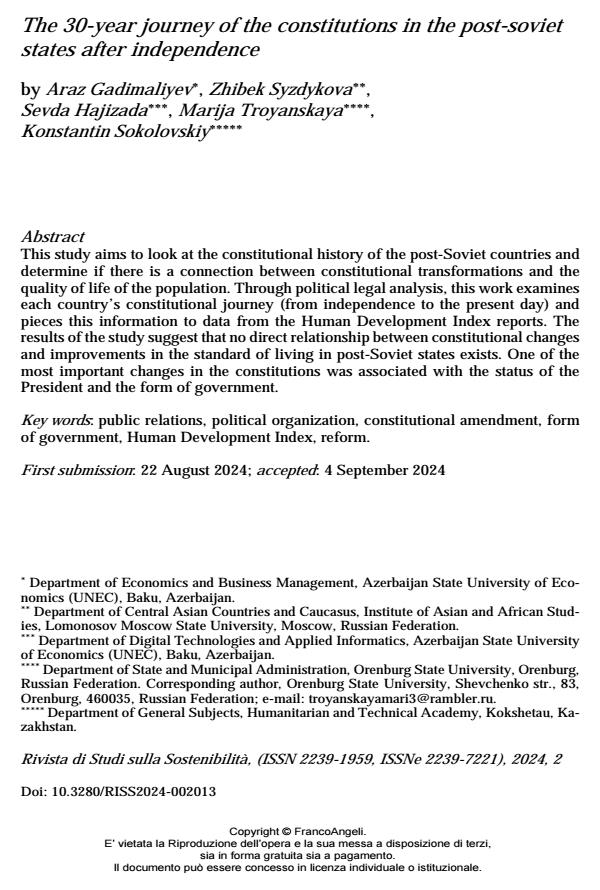The 30-year journey of the constitutions in the post-soviet states after independence
Titolo Rivista RIVISTA DI STUDI SULLA SOSTENIBILITA'
Autori/Curatori Araz Gadimaliyev, Zhibek Syzdykova, Sevda Hajizada, Marija Troyanskaya, Konstantin Sokolovski
Anno di pubblicazione 2024 Fascicolo 2024/2
Lingua Inglese Numero pagine 20 P. 219-238 Dimensione file 227 KB
DOI 10.3280/RISS2024-002013
Il DOI è il codice a barre della proprietà intellettuale: per saperne di più
clicca qui
Qui sotto puoi vedere in anteprima la prima pagina di questo articolo.
Se questo articolo ti interessa, lo puoi acquistare (e scaricare in formato pdf) seguendo le facili indicazioni per acquistare il download credit. Acquista Download Credits per scaricare questo Articolo in formato PDF

FrancoAngeli è membro della Publishers International Linking Association, Inc (PILA), associazione indipendente e non profit per facilitare (attraverso i servizi tecnologici implementati da CrossRef.org) l’accesso degli studiosi ai contenuti digitali nelle pubblicazioni professionali e scientifiche.
One of the key factors of any production is labor resources. Labor resources, to a greater extent than other factors of production, determine the strategic success of an enterprise, are the basis for ensuring its competitiveness, and therefore must be in sufficient quantity, of appropriate quality, and effectively managed. At the same time, HR administration becomes important in the management of an en-terprise based on a comprehensive solution to personnel issues, the introduction of new and improvement of existing forms and methods of work with personnel of enterprises and organizations. And labor law regulates social relations arising in the field of labor; determines the grounds and procedure for the emergence, change, and termination of a person’s right to labor; serves as an effective guarantee for a person in the protection and realization of his/her right to labor. The overall objec-tive of the study is to analyse the relevance of the HR profession and study global trends in HR management in order to understand possible changes in this area. The methodology of the latter is based on the general scientific dialectical method. Historical, logical-legal, logical-semantic, systemic, sociological, and comparative legal scientific methods were also used.
Parole chiave:HR administration, labor law, HR management, personnel, manage-ment, labor market.
Araz Gadimaliyev, Zhibek Syzdykova, Sevda Hajizada, Marija Troyanskaya, Konstantin Sokolovski, The 30-year journey of the constitutions in the post-soviet states after independence in "RIVISTA DI STUDI SULLA SOSTENIBILITA'" 2/2024, pp 219-238, DOI: 10.3280/RISS2024-002013